Archive for the ‘Wolfram Alpha’ Category
I was geeking out majorly yesterday while watching the new Star Trek movie with some friends and we got around to discussing Wolfram Alpha a fair bit (well, I was doing most of the talking to be honest – I’d had a LOT of coffee).
As I was explaining what it could and couldn’t do – I found myself saying ‘if you search for XYZ on Wolfram Alpha then..’ a lot and it quickly got old as it was nowhere near as succinct as ‘if you google XY then…”. It wasn’t long before I found myself saying ‘If you Walpha XYZ then…’ and no one pulled me up on it. Rather than saying ‘What the hell are you talking about…there is no such word as Walpha.’ – my friends uncounciously started using the term themselves.
Wonder if it will catch on?
If you are a developer and want to get your hands dirty with Wolfram Alpha – here is a link to the API documentation:
http://www.wolframalpha.com/developers.html
Not had chance to read it myself yet (in the middle of cooking for a dinner party) but would be interested in people’s thoughts.
I’m impressed! That sums up my initial feelings when I first started playing with Wolfram Alpha. As I played with it some more though it became apparent that this was wonderful project still needs a little work.
I knew that my friend Maria would get a crack at using Wolfram Alpha before I did so I checked her twitter feed to see what she thought about it. Astonishingly she uncovered a basic maths error – Wolfram Alpha tells us (at the time of writing) that the period of the tangent function is 2*pi when it is, in fact, pi. Digging a little further, I discovered that although it gives this incorrect result for the input tan(x),it gets it right for the input tan period.
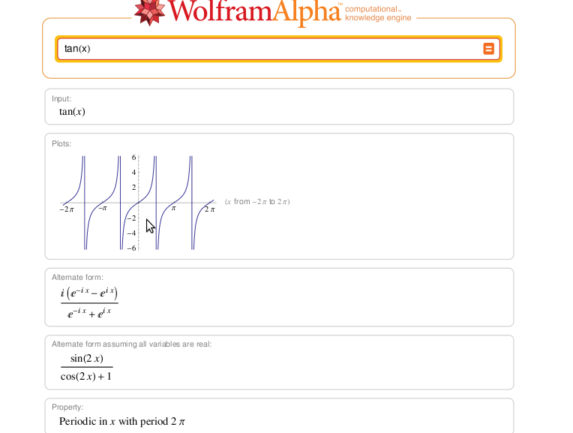
A minor bug (that I have no doubt will be fixed soon) to be sure but it does show that you can’t always trust the output of any computational system as they’ll always have bugs. Check, check and check again.
It’s fun to see that even though Wolfram Alpha is a major project for WR, it doesn’t always take itself too seriously. For example, it was inevitable that legions of geeks around the world asked the question ‘What is the meaning of life?”. WA gamely returns what we all expect.

I’d love to know how many times that was searched for.
References to popular geek culture continue. For example, you get the following error message when Wolfram Alpha gets overloaded.

I was astonished by the number of different data-sets you can search. For example, it contains US birth data so I can learn that use of the name Michael for new babies is in decline and yet it is currently the 2nd most popular baby’s name in the US today.

Looking at the chart that WA provides me I see that Michael started to become a popular name in the mid-1930s and I suddenly wonder what happened around 1935 to make it so popular. Can any US Historians help me out?
Right, so I know that Michael is the 2nd most common name in the US according to WA but what is the most popular name? How can I get it to give me that? The following searches (and a load of others) didn’t help me (at the time of writing).
This was getting frustrating. So I googled it and eventually came to a page from the social secuity administration. It agreed with WA that the 2nd most popular was Michael and it also tells me that Jacob is the most popular (WA agrees). They disagree on the years though (WA-2007, SSA-2008).
I am bringing this up, not because I am obsessed with names, but because I felt that Wolfram Alpha should be able to compute this sort of thing for me with ease. I’m sure it can but I simply can’t come up with the right search term. As a related question – try getting Wolfram Alpha to tell you which food in it’s database contains the most Vitamin C. I couldn’t do it at the time of writing – let me know if you succeed.
Looking back at this post it seems that my first impressions have been all negative. On the contrary, I am astonished at what it can do and think that it is a major new technology – it just has some growing pains. The mathematical implications are so great IMHO that I’ll leave that to a separate post.
More first impressions of Wolfram Alpha I have found (list will grow with time):
- Maria is worried about the implications that Wolfram Alpha has for teaching math. It has sparked quite a discussion.
- A Disappointing First Look At WolframAlpha
- WolframAlpha – Not a Google Killer, But is a Serious Threat.
- Most Humorous Wolfram Alpha Response (as of yet)
- Wolfram Alpha – Should have called it Deep Thought! – Screencast of one user’s first experiences.
- Sound bites from the BBC.
Update(21st May 2009): The ‘period of tan(x) bug’ has been fixed. That was quick!
The Wolfram alpha blog has posted a set of Wolfram Alpha examples where it does some pretty complicated mathematics. For example it can calculate the eigenvalues and eigenvectors of a 3×3 symbolic matrix – just the sort of thing you might turn to Mathematica for.
In another example it shows the result of a symbolic integral (which Mathematica can do) and it gives the steps that a human would need to do to get the same result (which Mathematica can’t do).
I know that Mathematica can do inifnitely more than one-liner calculations such as these but it makes me wonder. Will there be less call for the new, cheap(er) home editition of Mathematica once Wolfram Alpha goes live?
I’ve just been sent some screenshots of Wolfram Alpha in action. There are plenty of other sites that have done this now but here are some from my favourite Wolfram Research informant :)
Dieting advice….how to add apples to oranges.
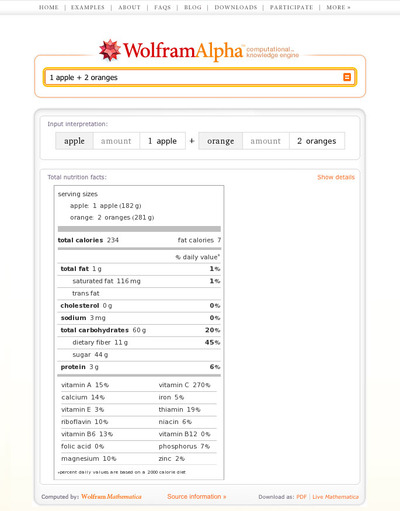
Power series for sin(x)
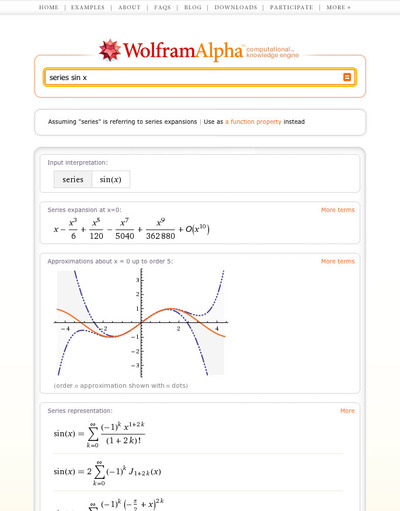
Search the human genome
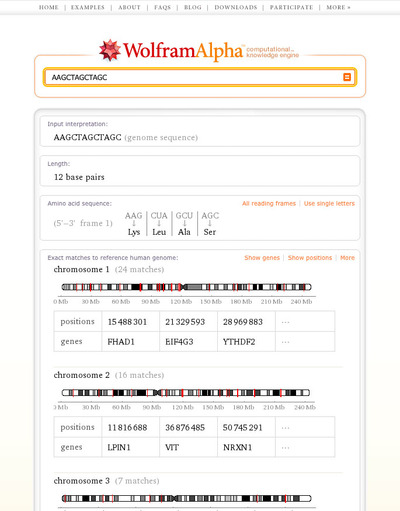
Facts about Polyhedra
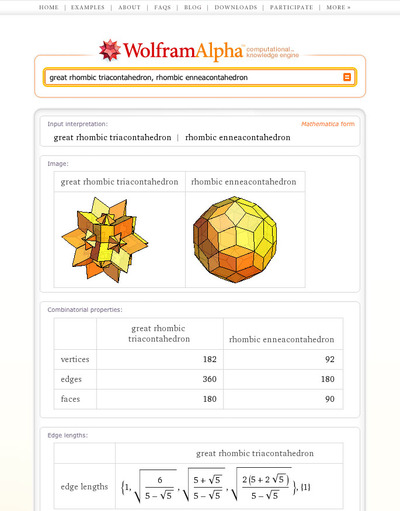
Might be useful if you are learning to play the piano (like me)
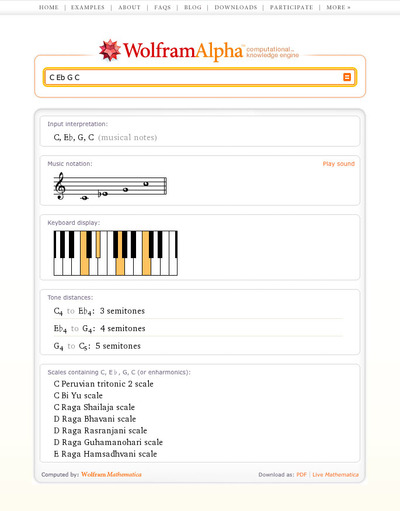
Looking good so far :) I can’t wait for this to be launched.
Update: Stephen Wolfram has just published a screencast where he demos Wolfram Alpha. Check it out for more juicy details.
Further update: Well Wolfram are a brave lot – they are going to do a live webcast when they launch on Friday. Take a look at the details.
I recently tried to get some screenshots of Wolfram Alpha from my contacts at Wolfram Research and failed miserably. Iddo Friedberg, however, had a lot more luck so head over to his blog, Byte Sized Biology, for some juicy Wolfram Alpha pre-release screenshot goodness.
Last month I (along with half of the blogging world it seems) reported on a new project from Wolfram Research called Wolfram Alpha. At the time I didn’t know much about it but since then much more information has been available.
Rather than write more about it myself, I will simply refer you to the information I have seen. First of all, the video below is a recording of a talk given by Stephen Wolfram about the project a couple of days ago. Click here if you prefer to watch this directly on YouTube.
Secondly, a new blog has started up called (predictably enough) The Wolfram Alpha blog. The first article is called The Quest for Computable Knowledge: A Longer View.
Many people are comparing Wolfram Alpha to Google which is completely wrong as far as I can tell. It’s a bit like comparing a table of logarithms with a computer algebra system (CAS) that can calculate any logarithm you like, in any base along with the ability to plot a graph of any function that contains a logarithm. The CAS can also differentiate, integrate, and simplify equations containing logarithms and so on. The table of logarithms contains pre-computed data that you can search whereas the CAS can do computations based on your ‘searches’ on the fly.
Let’s take an example from the talk that Stephen gave. Say you enter
6000C
(I assume this is what he entered, the video wasn’t so hot on showing the overhead projector connected to his laptop. I’d give good money to get some slides right now)
Wolfram Alpha tries to tell you something useful about this input drawing from the data-sets that it has access to. It also COMPUTES potentially useful things from these data sets. It’s the computation part that makes it fundamentally different from google (NOTE: I said different from, not better than or a competitor to – the distinction is important in my opinion).
Wolfram Alpha will say something like ‘assuming that C is a unit and assuming that unit is Celsius then I can tell you the following about 6000C’ It will then go on to tell you various conversion factors (such as, I guess, what it would be in degrees Fahrenheit or Kelvin). It might plot the black body spectrum at 6000 degrees C and show what colour a black-body object at that temperature would be.
All of these results will have been computed from scratch based upon various mathematical formulae and models that Wolfram Alpha has access to. Google, on the other hand, would only show the black body spectrum at 6000C if someone had calculated it in advance and put it up on a webpage.
Of course Wolfram Alpha knows a lot more than just temperatures. It knows about weather statistics, economic data, the human genome, properties of materials, symbolic integrals (and how to do them by hand) and loads more.
Looks like an exciting project! I wonder how Wolfram will make money out if it (or even if it intends to)?
One of my informants told me to expect something big from Wolfram Research in the near future but didn’t tell me what it was. No matter how hard I tried, she wouldn’t give me any details apart from ‘Stephen is very excited about it‘ and ‘A surprise announcement will be coming soon.‘ She sure knows how to get me intrigued.
Well, now the secret is out…sort of. Stephen Wolfram has just made a blog post about a project he has been working on for a few years called Wolfram Alpha.
I’ll be honest with you – I’ve read the blog post and I’m still not sure what this is all about but with phrases like:
…Fifty years ago, when computers were young, people assumed that they’d quickly be able to handle all these kinds of things. And that one would be able to ask a computer any factual question, and have it compute the answer.
and
It’s going to be a website: www.wolframalpha.com. With one simple input field that gives access to a huge system, with trillions of pieces of curated data and millions of lines of algorithms.
I am even more intrigued. Nothing is live yet – this is just an appetizer announcement but I am really looking forward to finding out more about what this is all about.
Any thoughts?
Update (18th March 2009): Doug Lenat has also seen a demo of the system and has discussed it in depth at Semantic Universe including the sort of questions that Wolfram Alpha won’t be able to answer.
John Hawks wonders if Wolfram Alpha will make bioinformatics obsolete? I don’t know enough about bioinformatics to comment but it’s an interesting article.
Update (9th March 2009): Someone with better connections than me has seen it in action. Check out this report for more details.

